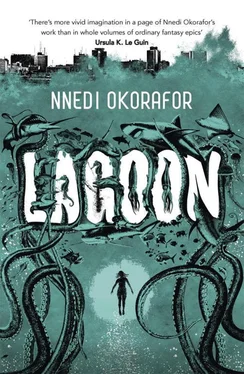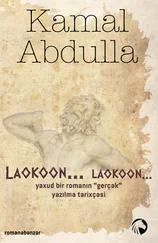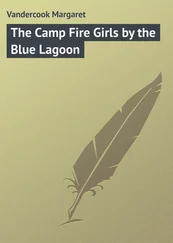It wasn’t something most people around him noticed. Everyone was too busy doing whatever they were doing. But Father Oke wasn’t going anywhere. He was not lost. For the first time in his life, his eyes were open. So he noticed those people who seemed a little off. Their faces didn’t carry as much emotion as other people’s. Or they seemed too calm. Too comfortable. Too adapted to the situation. They walked with too much grace. And they were everywhere.
He saw them helping people escape Area Boys. He saw two putting out the flames in a burning truck. He saw one helping a little girl find her father. He saw them watching as so many people of Lagos made fools of themselves.
“Oh Lord,” he said, rubbing his temples. “Oh my Lord, save us, o.”
“Excuse me, sir. Did you say something?”
He looked up. The woman was standing in the parking lot, looking at the building. She was curvy, wearing tight blue jeans and a white short-sleeve blouse that barely contained her large breasts. On each of her wrists she wore a shiny silver watch. Their faces sparkled in the moonlight. Only watches encrusted with diamonds did that. Father Oke remembered admiring the watch of a rapper once while he was in the United States at a fundraiser. Yes, those were very large breasts and very large diamonds.
“Uh, no, no, I didn’t say anything,” he said, his eyes taking all of her in. He regularly bedded his house girls and paid them to keep quiet about it. They were sexy, docile, pliable and certainly sweet. But this woman was something else. This woman was mysterious. And she reminded him of a woman he’d loved years ago.
She sashayed over to him. She wore those high-platformed heels he saw all the Nigerian actresses wearing in their films. Shoes that lifted them up but could never make them truly tall. He loved to watch them walk in those heels.
“Oh, I thought you did,” she said. She spoke like she was from the Niger Delta region. She was still looking at the building with a grand smile on her face.
He smiled, too. “Are you looking for someone in there?”
“No, no, I just love this building,” she said.
“Well, this is not the best time to come out and see it.”
“It’s crazy, yeah?” she said. She looked up at the bank. Father Oke frowned at the beautiful woman’s strangeness. She chuckled and looked at Father Oke. “The city is breaking itself,” she said. “But not one single pane of this building is broken.”
Father Oke looked at the Fin Bank and winced. The Fin Bank was one of Lagos’s most artistic structures, a gigantic trapezoid with arched wings made entirely out of square panes of glass. A few were red, but the majority of them were an ocean blue. It had gone by many names over the years but Lagosians had always called it the Glass House. He hated this building. He was sure that it was evil. Not surprising, with all the evil that was flooding the city tonight, that the Glass House should be spared.
“Do you want to come with me?”
He smirked. “Come with you where?”
“Answer my question first.”
Father Oke looked from her to the building and then to the sky. He could hear someone shout nearby and the sound of tires screeching. The worst night of his life had melted into the worst day. The night and day that everything fell apart. He turned to her. “Fuck it,” he said. “Yeah, I’ll go with you.” He laughed, imagining her heaving breasts bouncing above him as he took her right there on the deserted beach. He was already soiled, why not soil himself more? Might as well get some pleasure from the night.
“You know the mythology behind this place, sha ?”
“Yes, yes,” he quickly said. He didn’t want to think about it “Let’s go.”
“They say that because this building is so shiny and the color of the water, it creates an aura that attracts the sea. You see, the Atlantic always overflows at Bar Beach and that’s close to this building. So this place is always flooding.”
“OK, o,” he said, wanting to get moving before she said more. He took her arm and pulled. But she wouldn’t move. He frowned. She was like a heavy stone. He shoved her hard and still she didn’t budge.
She chuckled. “You know what they also say? That it’s not the ocean that is attracted to this place. That it is Mami Wata who loves this building. Do you know Mami Wata?”
“Yes,” he said. Mami Wata was the goddess of all marine witches.
She looked squarely at him. “This is my favorite building, o.”
Many things happened to Father Oke at once. He felt his heart break. Why had he slapped that woman so hard yesterday morning? Why had he slapped her at all? Twice in one night he had met a woman who was not really a woman. The first had been from outer space. This second was from the earth’s water. For the first time in his life, Father Oke truly realized that he lived in a glass palace, while others around him lived in a ghetto.
He gave up.
Father Oke gave in.
They left the Glass House, crossing the empty street. They were heading toward the beach.
No one ever saw Father Oke again.
Adaora, Anthony and Agu led the way as they walked along the beach, the President and his second wife behind them, flanked by his guards, Bamidele and Chucks. The morning sun was just warming the sky. The President was excited to get some fresh ocean air but there was a greater purpose in their long walk to the army boats.
“What is that?” Adaora said, pinching her nose. The sight of it was worse than the stench. A giant carcass stripped of all skin, putrefying in the increasing morning heat.
“That used to be a whale,” Agu said.
There were still a few people carving out pink slivers of unspoiled or semi-putrid meat. All were young men, many with desperate looks on their faces. To make the situation sadder, there was a camera crew filming them, and several well-dressed journalists interviewing people. There were even youths standing around holding their mobile phones up as they recorded the pathetic scene and probably posted it on YouTube. Adaora felt her gorge rise in her throat as she thought of the little boy on the monster road. Hadn’t these people gotten enough last night? Someone pointed at them and the President’s guards raised their weapons.
“Na de President!” a man carrying three slabs of stinky meat shouted.
“Oh my living God! Na dream I dey dream so.”
“How e go be de President? Dem been don deport de President.”
“And him been don die before dem deport am!”
Several of the people laughed hard.
“Na him be dat, sha . See him flat-chest wife, na.”
“Na him!”
Soon the President and his wife were surrounded by journalists, camera technicians and chattering civilians.
“I’m fine, I’m fine,” the President snapped. He frowned, wanting them to understand. He switched to Pidgin English, which he hated speaking. It was the ignorant man’s language. “Nothing do me,” he loudly proclaimed. “See me well well!”
The five journalists jostled to get a statement from him.
“Do you have anything to say about last night?”
“Where have you been?”
“How come you did not—”
“Last night,” the President said, switching to Standard English, “our biggest city ate itself. Now it is full and ready to give birth to itself. That is all I have to say on that.”
“Where have you been?” a male reporter asked.
“Sick. But now I am well.”
“Where are you going?”
“To see if I can make this better. You may follow us if you like. But do not try to follow us once we are on the water.”
“Oh my God,” a woman reporter said, pointing at Ayodele. “Isn’t that the woman extraterrestrial who got into all our technology yesterday?”
Читать дальше












